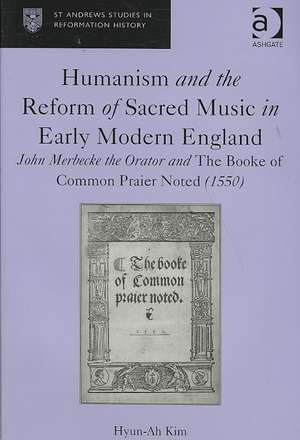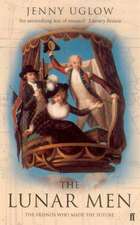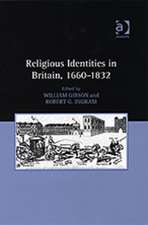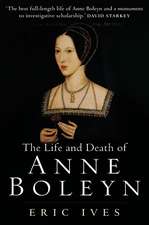Humanism and the Reform of Sacred Music in Early Modern England: John Merbecke the Orator and The Booke of Common Praier Noted (1550): St Andrews Studies in Reformation History
Autor Hyun-Ah Kimen Limba Engleză Hardback – 28 noi 2008
Din seria St Andrews Studies in Reformation History
- 15%
 Preț: 695.67 lei
Preț: 695.67 lei -
 Preț: 311.51 lei
Preț: 311.51 lei -
 Preț: 288.80 lei
Preț: 288.80 lei -
 Preț: 313.38 lei
Preț: 313.38 lei - 23%
 Preț: 932.49 lei
Preț: 932.49 lei - 30%
 Preț: 772.07 lei
Preț: 772.07 lei - 18%
 Preț: 1054.71 lei
Preț: 1054.71 lei - 18%
 Preț: 1000.27 lei
Preț: 1000.27 lei - 28%
 Preț: 880.05 lei
Preț: 880.05 lei - 30%
 Preț: 768.30 lei
Preț: 768.30 lei - 15%
 Preț: 240.92 lei
Preț: 240.92 lei - 26%
 Preț: 822.34 lei
Preț: 822.34 lei - 18%
 Preț: 1000.27 lei
Preț: 1000.27 lei - 30%
 Preț: 783.79 lei
Preț: 783.79 lei - 25%
 Preț: 766.66 lei
Preț: 766.66 lei - 18%
 Preț: 1000.27 lei
Preț: 1000.27 lei - 25%
 Preț: 498.88 lei
Preț: 498.88 lei - 18%
 Preț: 1053.16 lei
Preț: 1053.16 lei - 31%
 Preț: 767.88 lei
Preț: 767.88 lei - 18%
 Preț: 1054.71 lei
Preț: 1054.71 lei - 31%
 Preț: 764.87 lei
Preț: 764.87 lei - 18%
 Preț: 1005.01 lei
Preț: 1005.01 lei - 25%
 Preț: 768.82 lei
Preț: 768.82 lei - 26%
 Preț: 765.19 lei
Preț: 765.19 lei - 18%
 Preț: 1062.98 lei
Preț: 1062.98 lei - 31%
 Preț: 764.20 lei
Preț: 764.20 lei - 30%
 Preț: 769.55 lei
Preț: 769.55 lei - 25%
 Preț: 768.30 lei
Preț: 768.30 lei - 25%
 Preț: 770.31 lei
Preț: 770.31 lei -
 Preț: 349.80 lei
Preț: 349.80 lei - 31%
 Preț: 765.84 lei
Preț: 765.84 lei - 26%
 Preț: 765.84 lei
Preț: 765.84 lei - 18%
 Preț: 1004.20 lei
Preț: 1004.20 lei - 27%
 Preț: 496.94 lei
Preț: 496.94 lei - 18%
 Preț: 1001.84 lei
Preț: 1001.84 lei - 25%
 Preț: 770.62 lei
Preț: 770.62 lei - 25%
 Preț: 739.65 lei
Preț: 739.65 lei - 25%
 Preț: 772.76 lei
Preț: 772.76 lei - 31%
 Preț: 767.47 lei
Preț: 767.47 lei - 18%
 Preț: 1063.89 lei
Preț: 1063.89 lei - 18%
 Preț: 1057.09 lei
Preț: 1057.09 lei - 26%
 Preț: 765.01 lei
Preț: 765.01 lei - 31%
 Preț: 764.20 lei
Preț: 764.20 lei - 18%
 Preț: 1005.04 lei
Preț: 1005.04 lei - 25%
 Preț: 768.46 lei
Preț: 768.46 lei - 31%
 Preț: 763.39 lei
Preț: 763.39 lei -
 Preț: 376.48 lei
Preț: 376.48 lei
Preț: 1062.62 lei
Preț vechi: 1295.88 lei
-18% Nou
Puncte Express: 1594
Preț estimativ în valută:
203.32€ • 213.43$ • 168.77£
203.32€ • 213.43$ • 168.77£
Carte tipărită la comandă
Livrare economică 10-24 aprilie
Preluare comenzi: 021 569.72.76
Specificații
ISBN-13: 9780754662686
ISBN-10: 0754662683
Pagini: 274
Dimensiuni: 156 x 234 x 16 mm
Greutate: 0.68 kg
Ediția:1
Editura: Taylor & Francis
Colecția Routledge
Seria St Andrews Studies in Reformation History
Locul publicării:Oxford, United Kingdom
ISBN-10: 0754662683
Pagini: 274
Dimensiuni: 156 x 234 x 16 mm
Greutate: 0.68 kg
Ediția:1
Editura: Taylor & Francis
Colecția Routledge
Seria St Andrews Studies in Reformation History
Locul publicării:Oxford, United Kingdom
Cuprins
Contents: Foreword; Introduction; A humanist John Merbecke; Erasmian humanism and the reform of sacred music; Anglican plainchant in the making; Rhetoric and the reform of plainchant in The Booke of Common Praier Noted (1550); Conclusion; Appendix; Bibliography; Index.
Recenzii
’...will significantly shift the angle from which the subjects have been viewed, filling gaps in the literature... may well remain for some time as the first reference for scholars on the topics concerned...the book will be of interest to musicologists, to historians of the Reformation and to theologians with an interest in the aesthetics of music...There is much to be heartily welcomed in the book.’ Reviews in History ’...packed with interesting facts and figures...to be welcomed for shedding more light on what has been a badly neglected area in liturgical history.’ The Tablet ’...this is a scholarly work which has much to teach us about the religious and musical milieu of which Merbecke formed a notable part.’ Reformation and Renaissance Review ’This is a very substantial book, carefully and thoroughly researched and containing a large bibliography. ... In short: this is an important book, and not only for musicians...’ The Consort 'This book is valuable for the fresh look that it takes of John Merbecke.' Music and Letters
Notă biografică
Dr Hyun-Ah Kim is a Fellow of the Centre for Reformation and Renaissance Studies at the University of Toronto, Canada.
Descriere
This book provides a new interpretation of John Merbecke (c.1505-c.1585), the Tudor musician, copyist and writer. Providing a new contextual study of Merbecke, it re-interprets his work in the light of humanist rhetoric. It shows how Merbecke’s 1550 publication The Booke of Common Praier Noted was an Anglican epitome of the Erasmian synthesis of eloquence, theology and music. The book thus explores the work of Merbecke as a humanist reformer, through re-evaluation of his contributions to the developments of vernacular music and literature in early modern England. As such it will be of interest, not only to church musicians, but also to historians of the Reformation and students of wider Tudor culture.














